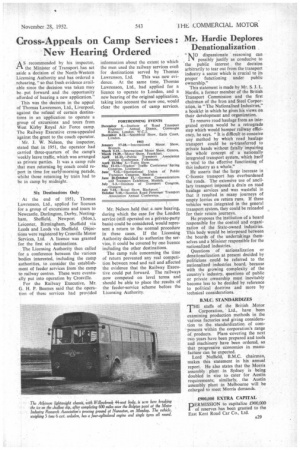Cross-Appeals on Camp Services : New Hearing Ordered
Page 31

If you've noticed an error in this article please click here to report it so we can fix it.
AS recommended by his inspector, the Minister of Transport. has set aside a decision of the North-Western Licensing Authority and has ordered a rehearing, "so that fresh evidence available since the decision was taken may put forward and the opportunity afforded of hearing a new application." This was the decision in the appeal of Thomas Lawrenson, Ltd., Liverpool, against the refusal of certain destinations in an application to operate a group of excursions and tours from West Kirby Royal Air Force camp. The Railway Executive cross-appealed against the grant to the coach operator. Mr. J. W. Nelson, the inspector, stated that in 1951, the operator had carried three-quarters of the camp's weekly leave traffic, which was arranged as private parties. It was a camp rule that men returning by coach could report in time for earl-morning parade, whilst those returning by train had to be in camp by midnight.
Si s Destinations Only At the end of 1951, Thomas Lawrenson, Ltd., applied for licences for a group of excursions and tours to Newcastle, Darlington, Derby, Nottingham, Sheffield, Newport (Mon.), Leicester, Birmingham, Sheffield via Leeds and Leeds via Sheffield. Objections were registered by Crosville Motor Services, Ltd. A licence was granted for the first six destinations. The Licensing Authority then called for a conference between the various bodies interested, including the camp authorities, to consider the .establishment of feeder services from the camp to railway centres. These were eventually put into operation by Crosville. For the Railway Executive, Mr. G. H. P. Beamcs said that the operation of these services had provided
information about the extent to which the men used the railway services even for destinations served by Thomas
Lawrenson, Ltd. This was new evidence. At the same time, Thomas Lawrenson, Ltd., had applied for a licence to operate to London, and a new hearing of the original application, taking into account the new one, would clear the question of camp services.
Mr; Nelson held that a new hearing, during which the case for the London service (still operated on a private-party basis) could be considered, would represent a return to the normal procedure in these cases. If the Licensing Authority decided to authorize the service, it could be covered by one licence including the other destinations. The camp rule concerning the time of return prevented any real competition between road and rail and affected the evidence that the Railway Executive could put forward. The railways now competed on level terms and should be able to place the results of the feeder-service scheme before the Licensing Authority.




















































































